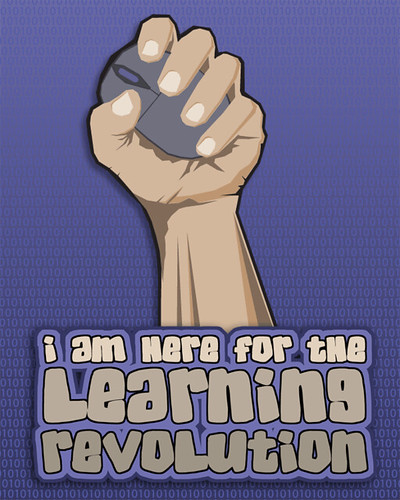Personal Revolutions In Teaching
 Every year, I go through a personal revolution in teaching. Often this is because of my reflections on the previous year, or some reading I am able to do over the summer. Generally speaking it means two things:
Every year, I go through a personal revolution in teaching. Often this is because of my reflections on the previous year, or some reading I am able to do over the summer. Generally speaking it means two things:
1. I am always excited to start a new semester.
2. Everything (it seems) needs to be tweaked to align with my new framework!
For example, a few years ago, I had been doing a lot of reading and reflecting on the classroom as a community for learning. This had a big impact that year (and every year since) because it was the first time I consciously put effort into building a classroom community and recognized that I was a very important aspect of how the community developed. Nowadays, I put considerable time each semester into teaching the students how to support each other in their learning. I think it has made quite a difference. For reference, my intro day presentation reflects some of the key themes in my classroom.
This year, my personal revolution has been about developing “authentic learning”. I know this term is used to mean a number of different things, but for me it implies that students have a sense that what they are learning relates to the world in a broader context – that students understand why something is important.
In Science education we often teach backwards – first pushing knowledge, then demonstrating the application of the knowledge. But this is putting the cart before the horse. In most cases, the application is the reason why the knowledge is important in the first place! If we flip our curriculum around, then students will have a sense of the “big picture”. Furthermore, they will have a framework for understanding in which to situate new knowledge.
The idea of creating more authentic learning experiences became crystal clear to me during a conversation I had with one of my colleagues last semester. While discussing the redevelopment of the Biology unit in Grade 10 Science he suggested, “let’s not teach the cell cycle yet, let’s first teach about cancer.” All at once, it was obvious to me: Cancer is the vehicle through which the cell cycle is important!
Consider in what order these two videos could be presented:
Besides the fact that the first video about the cell cycle is extremely boring (I would never use it), it also lacks any context or relevancy. For students, learning about the cell cycle from the first video is the equivalent of asking an adult to memorize a list of street names without telling them where they are driving to!
I might use the second video in order to open up a discussion of cancer in my classroom. We could start by sharing what we already know about cancer. Then, when we try to answer the question of “what causes cancer?”, it becomes clear that we need more knowledge – that’s when the cell cycle come in! Next, we can learn about how to treat cancer and again, we see that we need a more detailed understanding of the cell cycle to understand chemotherapy and other treatment methods that are currently in development. All the while, every new piece of knowledge is fixed into a framework – a way to understand the relevancy of the content.
Some teachers may be reading this post and thinking, “I do not have enough time to cover content in this way.” Understand that I am not suggesting that you try to teach more than is already in the curriculum, only that you reverse the order such that what you teach has greater meaning and relevancy. As it is, the new Ontario Science Curriculum (2008) is deliberately structured with Application expectations presented first, Thinking and Communication next, and Knowledge last.
We must not forget that what students learn in the long run is a small subset of what you covered. We need to think of ways to maximize what students learn and not what we can cover.
On a more personal note, my wife is always reminding me, “sometimes good enough is good enough.” She tells me that even though I am most excited about my latest “revolution”, I was a good teacher last year too. And, if I had to use last year’s lesson again this year without “revolutionizing” it, the lesson would still be great … so turn off the computer and come to bed! She’s right.
Photo Credit: Wesley Fryer
Comments (2)